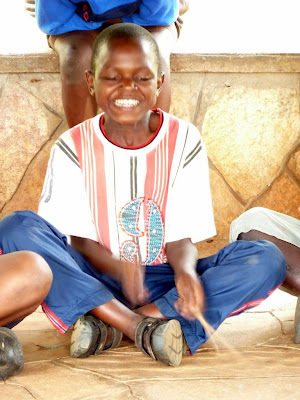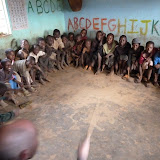On Sunday we left Rwanda behind, and entered
Uganda, a country which had suffered from continuous instability and war for decades just until recently. Uganda is home to some 35 million people that belong to dozens of different ethnicities and speak many different languages, a third live under the poverty line; that in itself makes it difficult to maintain peace in the country, not to mention that Uganda also borders with two of the largest and most unstable countries in Africa,
Sudan and
Congo.
The difference between Rwanda and Uganda was very apparent already at the border, where there was no public transportation and we had to hire taxi scooters transportation to Gisoro: The same distance cost half the price in Uganda compared with Rwanda, and the mechanics, engine and helmet situation of the Ugandan scooters is much worse, especially because in Uganda there are no helmets.
 |
| Goodbye Rwanda, Goodbye Helmets - Danny on a scooter in Kigali, Rwanda |
The scenery crossing the border at the Cyanika border was staggering. Hills painted in a hundred shades of green situated at the feet of the three gigantic volcano mountains where gorillas dwell. We arrived in the town of Gisoro at noon, and again had to do with a chock-full private car which pretended to be a taxi, as the first bus to the more central city of Kabale, our destination, departed only in the evening. On the way, which is mostly unpaved, we got a flat tire.
 |
On the road to Kabale, Uganda - the three peaks of the
Virunga volcanic mountain range can be seen in the distance |
 |
Waiting for the men to fix the flat tire, village children
gather around Fabienne |
The day after we arrived in our guest house literally touching Lake Bunyonyi, we joined Busco, one of our local partners, and struggled to climb the mountain to the nearby village where the Mindful Market Orphanage is situated. The scenic route up the mountain was breathtaking, in both senses: when we reached the top, we were out of breath. Our protestations about the wearying climb felt very improper when later we heard from one of the teachers that every morning she climbs the mountain from the other side, which is much steeper, on a longer road, for two hours, and, hold tight, with a baby strapped to her back.
 |
| Struggling to climb the mountain to reach the orphanage |
 |
Walking back to the guest house in the afternoon
with Catherine, one of the orphanage teachers, and her baby |
|
The Mindful Market Orphanage was founded three years ago by Crystal, a Canadian woman with a huge heart. There are about 60 orphans age 3-6 who receive education, food, and especially love by the orphanage staff and teachers. Due to extreme poverty, bad nutrition, and lack of or poor access to medical treatment, the orphans lost their parents to various diseases and especially AIDS, TB, and malaria. Goodhearted individuals from richer countries sponsor the kids, or support the orphanage's education program, maintenance and expansion.
 |
| Dancing with the 3-6-year-old orphans |
We have not encountered such extreme poverty since we came to Africa. The orphanage children received uniform, but the older kids in the village wear the same dirty, shredded clothes everyday. The vendors in the market in the village sell tattered clothes for 50 dollar cents, which, judging by their prints, were probably sent in charity packs by people in the West somewhere in the eighties. Some of the children have distended bellies as a result of malnutrition. Most eat one meal a day.
 |
| With the older kids |
We worked with the orphans and with older children from the nearby village for three days. Two hours in the morning with the little ones – about 60 in number, and two hours in the afternoon with the other kids in the village, who every day seemed to multiply, as the word about our workshops spread quickly. In the last day we had more than 60 children in the afternoon session, from age 3 to 16. In the end of the last day they sang for us traditional songs.
 |
| The children singing traditional songs for us |
Click here to download / listen to the first traditional song recording.
Click here to download / listen to the second traditional song recording.
Meanwhile, we enjoyed the most stunning waterscape of lake Bunyonyi and the surrounding hills, with mud and wicker huts dotting the steep slopes in between towering trees of palm and banana. Mornings were a symphony of chirps, tweets, moos, and cock-a'doodle-doos. The lake is also one of the only safe lakes in the country to swim.
 |
Lake Bunyonyi - the little white dot in the water, in the center
of the photo, in between the palm trees, is Danny |
 |
| Lake Bunyonyi at night |
We have request:
visit the website of the orphanage, and see if you can help by sponsoring a child, or spreading the word. We have too many beautiful photos from the workshops in the orphanage, so we put the best ones on a web album for you to enjoy:
Until next time!


















































